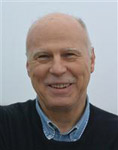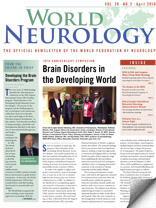By Wolfgang Grisold

Wolfgang Grisold
The EFNS and the Austrian Society of Neurology (OEGN) hosted a Patient Day on Sept. 21, at the site of the World Congress of Neurology in Vienna. It was opened by Eduard Auff, the Congress president; Vladimir Hachinski, WFN then-president; and Richard Hughes, EFNS president; signaling a high value and interest for this event.
The event was announced and publicized by media in Austria prior to the meeting.
Patient Days are important events within congresses, where distinguished speakers present new developments of the field and, where in a discussion following their presentations, attendees are able to ask questions. For the first presentation, a video presentation of a patient with a brain tumor was selected. The other disease topics were stroke, Parkinson’s disease and MS, each followed by time for discussion. The presentations were in German, and Austrian groups and associations for specific diseases (e.g. MS, stroke, Parkinson) were invited, as well as the OEGN website reps and media. About 400 patients and relatives attended and listened to the presentation by experts.
Within the EFNS, a Patient Day, in cooperation with EFNA, took place in Helsinki in 2003. It was aimed at translating the patients’ needs into a dialogue toward better medical care and quality of life and has since become a permanent feature of the meeting. Other medical specialties, in particular oncology, have regular patient days to inform, and also learn about patients’ needs.
For the World Federation of Neurology, this was a new type of meeting, aimed at including patient and caregivers, assessing their needs and receiving input to improve neurological services.
Patient days also serve to inform patients and caregivers in an efficient way regarding new developments. This is important, as patients and caregivers often get information from media and from the Internet, and they may have difficulty determining what is the most correct information. Conversely, and perhaps more important, is the fact that the medical profession needs to know what it is that patients wish to know, and what patient and caregiver questions are.
Many aspects of the relationship of patient/caregivers with their physicians are changing.
Medicine developed from a paternalism-defined structure into a more patient-driven autonomy structure. Sometimes, the bureaucracy is overarching into an “in-between” model of physician-patient/caregiver interaction. Thus, it is more important than ever that physicians and patients find ways to communicate and work together. Health organizations often include patient representatives on their boards, and in many European guideline committees, patient representatives are already important constituents.
Another important way to look at this kind of meeting is its role in furthering advocacy — better communicating health needs to local and national institutions and bodies. The basic source of need in all matters of health issues is the needs of patients and their caregivers, which drive the need to enable progress in medicine and in health structures. Health structures depend on general policy, and the role of advocacy is to make needs of patient/caregivers and health professionals heard.
Finally, and this is the summary of this task, informed patients will be better partners in fighting neurological disease.
We hope that the patient day, after its successful introduction in Vienna, will become a regular part of WFN Congresses.
If you need more information, contact me at wolfgang.grisold@wfneurology.org (WFN) or Tanja Weinhart (OEGN) at weinhart@admicos.com.
